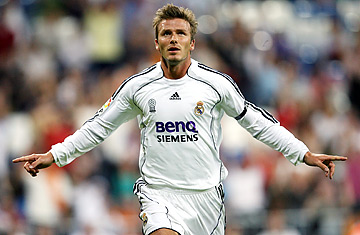
David Beckham celebrates after scoring a goal in a Spanish league match between Beckham's Real Madrid and Real Sociedad in Madrid, Spain, in September 2006.
Beckham today is still a marquee name, but he's no longer a marquee player. Even at age 31, he's lost his place in the Real Madrid starting lineup and in England's national squad, and Real had announced they would not renew his contract in the summer. Indeed, skeptics have long suggested that Real had signed Beckham from Manchester in the first place less for his on-field ability than for his global glamour-icon status, which would help the team sell replica gear all over the world. To be fair, Beckham earned his keep as a rather talented right-sided midfielder capable of providing pinpoint crosses to his forwards, and with an ability to bend free kicks around or over defensive walls that is quite rare among Englishmen (although pretty common among top-drawer players from Europe and Latin America).
Still, his arrival will give a major boost to the game in the U.S. — not in terms of the level of play, but its profile in the American mainstream. Beckham, together with his wife Victoria (a.k.a. Posh Spice) have between them graced the covers of more fashion magazines than anyone can remember. Their arrival in L.A., a natural home for the perennially bronzed and beautiful couple, gives Major League Soccer its first crossover celebrity, whose very presence in America is likely to give a significant bump to interest in and attendance at its games. Nor will Beckham be alone among waning stars in crossing the Atlantic: His deal was made possible by change in MLS rules to allow each team to sign one player outside of the limits of an existing salary cap that prevented Americans teams from offering rewards that would tempt many European stars.
But for the wider soccer-playing world, Beckham's decision to leave Real for L.A. is tantamount to retirement, a graceful departure from the stage on which the world follows the game — i.e., Europe — while still close to the top of his game. To understand the significance of Beckham's arrival, it is worth noting that in the same week, Clint Dempsey, a star forward of Team USA, signed for the London club, Fulham, where he'll join other USA stars Brian McBride, Carlos Bocanegra and possibly soon also Oguchi Onyewu on the playing staff. There he'll play against the likes of his national team captain Claudio Reyna and winger DaMarcus Beazley, who play for Manchester City, midfielder Bobby Convey at Reading and goalkeepers Tim Howard (Everton) and Brad Friedel (Blackburn). In case the point here is missed, the marquee name American players — like their counterparts from Africa and Latin America — will mostly play in Europe, which is the epicenter of the global game.
The European Champions' League is a kind of global soccer equivalent of Major League Baseball. And Beckham joining the L.A. Galaxy as the equivalent of a Ken Griffey, Jr., choosing, in the waning years of his playing career, to sign a last lucrative contract with a franchise in Japan — certainly good for the game in Japan, but more a testament to a player's declining abilities than to the talents he exhibited in his prime.
